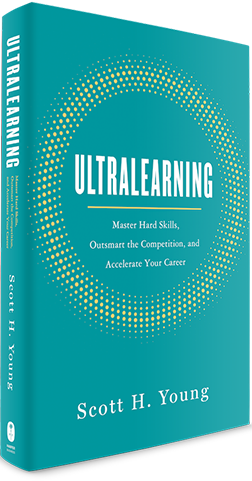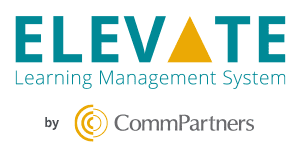
Understanding how to learn and master new and difficult skills is essential in today’s rapidly changing world. And Scott H. Young, a committed lifelong learning, blogger, and author of the newly released book, Ultralearning: Master Hard Skills, Outsmart the Competition, and Accelerate Your Career, has spent the past decade becoming an expert on how to successfully do this.
Through completing a wide range of self-education projects—things like completing MIT’s four-year computer science curriculum in 12 months and learning four languages in one year—Scott, an ultralearner himself, has really walked the walk when it comes to pushing our ideas about learning to the limits.
In this episode of the Leading Learning podcast, Jeff talks with Scott about his book Ultralearning, including the projects that led to writing it, the principles behind it, and how learning businesses can apply the research to help the learners they serve.
To tune in, just click below. To make sure you catch all of the future episodes, be sure to subscribe by RSS, Apple Podcasts, Spotify, Stitcher Radio, iHeartRadio, PodBean, or any podcatcher service you may use (e.g., Overcast). And, if you like the podcast, be sure to give it a tweet!
Listen to the Show
Read the Show Notes
[00:18] – A preview of what will be covered in this episode where Jeff interviews blogger and author of Ultralearning, Scott H. Young.
[02:27] – Introduction to Scott.
[03:31] –How do you describe yourself and the work you do?
Scott describes his work as unusual self-education projects, something he’s been doing for the last ten years. For example, the MIT challenge, (a project to learn the entire 4-year MIT curriculum for computer science, without taking any classes and in 12 months), a “Year without English” project (where he traveled to 4 different countries to learn 4 different languages), as well as a variety of other projects such as portrait drawing, quantum mechanics, and more.
Scott says writing the book, Ultralearning wasn’t just about documenting what’s worked for him but it was also about finding a diverse group of “ultralearners”—people who take on intriguing and impressive efforts to get good at something in unusual ways.
He documented this in the book in an effort to pull together some of the principles that go into how they’re able to learn and master hard skills quickly. And he did this in hopes that it can help other people apply those same ideas to their own lives, careers, and/or the learners they serve.
A Passion for Learning
[05:03] – You are obviously very passionate about learning. What’s the source of that passion?
Scott shares that he’s always been a curious person who has enjoyed learning new things. But what transformed it from being a curiosity to an obsession has to do with an experience he had in college as an exchange student (struggling) trying to learn French. Around that time, he was introduced Benny Lewis (now famous for his Fluent in 3 Months projects), an ultralearner.
Scott was blown away by not only Benny’s results, but also his whole philosophy towards learning, which epitomizes the ultralearning concept. This means not only taking on the initiative for your own learning efforts—so not just passively waiting to be told what to do from teachers/environment, but instead active about deciding what you want to learn and how you’re going to learn it—but also going further than most people to pursue more aggressive or intense methods in order to get results.
One of the recurring patterns Scott has seen is that very often the effective method for learning does involve a little more discomfort and frustration. He says our brains are naturally averse to putting in effort that creates learning so we often want to do easier activities. This is a shortcut that you can preserve in your head if you don’t really know what works. He notes that once you experience the other way of learning first-hand you just get converted and there’s no other way of seeing it.
So having the exposure to Benny and then later trying out his own projects is what really convinced Scott that the potential to learn and get good at things that seem really hard is actually much greater than most people realize.
[08:29] – A further discussion about how valuable it is to understand that learning simply takes effort.
Jeff points out that many learning leaders may be uncomfortable pushing people to make an effort, particularly adult learners because they feel like they shouldn’t push them too hard. But often the learning doesn’t happen without that.
See our related episode, The Trend That Isn’t: Learner Responsibility.
Scott adds that a lot of times educators know what works and they want to convince students—but the students don’t want to do it. However, Ultralearnerswas actually written for the student because as a learner, if you know how your mind works, you can debug a lot of your own processes. He says it’s just unfortunate that most of us haven’t learned how to learn.
See our related episode, Learning How to Learn with Dr. Barbara Oakley.
Sponsor: AUTHENTIC Learning Labs
[10:09] – If you want to gain insight into what’s most effective for your learners, we encourage you to check out our sponsor.
AUTHENTIC Learning Labs is an e-learning company that offers products and services to help improve your current investments in education. One key product is Authentic Analytics, a dedicated suite of visualization reports to help analyze and predict the performance of education programs. Organizations use Authentic Analytics to easily scan through volumes of data in intuitive visuals, chart performance trends, and quickly spot opportunities, issues, and potential future needs.
MIT Challenge
[10:53] –Can you talk in more detail about the MIT Challenge?
Scott talks about how after he graduated from university as a business major he wasn’t really in love with the degree he got. Around that time, he found there were free classes put on by MIT (some totally complete with lectures/assignments/exams, some not). So this seemed like a perfect alternative since he didn’t want to go back to school).
This made him realize that there’s a lot of assumptions baked into how we think about going to school that are there either because of convenience or the student. And they aren’t necessarily something you have to follow.
He points out if you are in a classroom listening to a lecture, you have to listen to the whole thing—and this includes inefficiencies such as time to get there, down time waiting, getting distracted, etc. Whereas if you watch a lecture video, you can do things like watch it at 1.5x speed and re-watch parts you don’t understand.
Scott had the notion of simplifying the degree with a goal of passing the final exam. And later he added on programming projects for classes that had them. So it was a skeleton of an MIT degree, pursued in an unconventional way with no credit, just the knowledge. But it was his first big ultralearning project and the one he is most well known for.
And although Scott doesn’t think everyone doing this project would necessarily have success with it, he feels that the assumptions that school has to take place over four years, or that it is required to get skills that are useful for your professional life, is completely false.
So if you decide what you want to get out of your learning experience, you can very often go straight for that and avoid a lot of the fluff.
Sponsor: CommPartners
[15:07] – If you want a learning platform that will help your learners get past the fluff and go straight for the most relevant content, be sure to check out our sponsor for this quarter.
CommPartners helps learning businesses conceive, develop, and fulfill their online education strategy. Their solutions begin with Elevate LMS, an award-winning learning platform that provides a central knowledge community and drives learner engagement. To extend the value of Elevate, CommPartners provides a wide range of online education services including curriculum design, instructional design, fully managed Webinars, Webcasts, livestream programs, and virtual conferences.
Principles of Ultralearning
[16:10] – Can you tell us more about what you cover in Ultralearning?
Scott explains that a bulk of the book is divided into 9 principles of ultralearning. And each of the principles embodies both a lever that you can use to get better results and also common mistakes.
Two principles of ultralearning Scott highlights in detail (both with interesting scientific research behind them) are:
- Directness–basically, learning is more effective if done with a direct connection to the area you eventually want to apply the skill.
[19:31] –
- Retrieval– studies around this showed learners had better retrieval when they read a passage and were forced to recall it versus those who just it read over and over. But the repeated reviewers are the ones that thought they learned the material best.
This points to a cognitive quirk that very often we judge our own learning in ways that aren’t entirely accurate. This leads to us spending lots of time on learning activities only to find out that when we need the knowledge it doesn’t transfer/apply, or isn’t available in memory.
Jeff and Scott further discuss the importance/relevance of retrieval and the serious effort it requires beyond just repeated reading. And they both share how they’ve had to use it to deliver keynotes/speeches.
Scott notes a concept in the retrieval literature known as desirable difficulty (coined by Robert A. Bjork), which shows that more difficult retrieval results in better memory.
[23:16]– I know you tried to find some commonalities across the ultralearners you wrote about. Is it the people who just intuitively get the principles that you’re writing about? To what extent have they learned to learn? To what extent did they just figure it out themselves? What’s common across these people who engaged in ultralearning and were successful at doing it?
Scott says there are obviously people in his book who do understand the learning process well. For example, Benny Lewis (referenced above) and Roger Craig who built a website to become good at Jeopardy. But the thing about ultralearning in itself is when you talk about it with really dramatic stories, it can feel unapproachable.
But the principles aren’t actually very distant or out of line with how you might have experienced things, rather he’s trying to illustrate the principles behind when you’ve learned something successfully versus when you didn’t. If you can understand those principles then you can set yourself up for success.
Ultralearning Takeaways for the Average Learner
[25:43] – Is this [understanding when you’ve learned something successfully versus when you didn’t] really the message for the average learner who reads the book who maybe isn’t going to take on the big ultralearning challenges but simply wants to be a better learner? Is this an ongoing reference for them to go back and see if they’re doing those things in their learning to be more successful?
Scott shares that the message in Ultralearning is that we all have the potential to be ultralearners. We won’t all be Albert Einstein or win Nobel Prizes. But the message of teaching yourself difficult skills/skills that feel difficult to you right now and learning them well on your own is something he thinks is available to all people if they approach it the right way.
He says the idea is to first get some confidence because there are probably things in your past that you have learned well. You just might not have been aware of why you learned it well. And often we put blame on talent, the teacher, etc. when often the ingredients were there to learn but they just didn’t line up perfectly.
So even though not everyone is going to take on big ultralearning challenges, they can still learn something that matters to them—and learn it well by applying the right principles.
Scott also shares a story about a librarian, Diana Fehsenfeld, who, as she was nearing the end of her career, realized she needed to upskill. In order to take her librarian skills into the 21stcentury she learned statistical programming and data visualization and became quite indispensible.
This represents an ordinary case where somebody challenged themselves to learn something that felt difficult. And then made a change in their career or lives as a result.
Jeff stresses that this is a great practical example that everyone should take to heart because every job is going to change and we’re all going to have to adapt.
See our related episode, The Future of Work with Michelle Weise.
[28:29] – I know writing a book in of itself is kind of like an ultralearning project. What did you learn new in the process?
Scott talks about his journey writing the book as a non-researcher/learning enthusiast, as opposed to a learning expert. So he had to dig in deep to explore the subject to a new level of depth. It was his opportunity to learn as much as could about how the mind works. And he really wanted to get a sense of the broader picture being painted by all of the research.
[30:08] – Our audience is made up of people who serve lifelong learners, mostly through providing fairly traditionally continuing education and professional development experiences. How can this group best make use of Ultralearning?
Scott recommends one of the things you can do as an educator (if you’re aware of these principles of learning), is that you can become a facilitator for people. Like the expression, “You can lead a horse to water but you can’t make them drink”, he says the same is very true of learning. You can present someone with resources and materials but you can’t make them learn—it has to be something that goes on inside the student’s mind.
When he works with students or educators, he feels that part of our responsibility is also to tell them explicitly what they need to do to be successful. And say exactly what you’re going to be able to provide and not going to be able to provide. He shares how this would look related to the principles, directness and retrieval (above).
It’s unfortunate how at large, a lot of the findings from educational psychology have trickled down to teachers, but much more rarely to learners. So part of our goal as educators shouldn’t just be to give people content knowledge but also to give them the pointers and tools so they can take that content knowledge and turn it into real-world skills.
[33:00] –What’s next for you? Where will you be focusing your efforts post Ultralearning?
Scott admits his list of projects to take on is already very long. Some of the things he’s wanted to work on involve chess, oil painting, music, and maybe some kind of physical skill (although he’s not sure which one).
He also has interest in improving his own professional skills, particularly as a writer. And he wants to continue learning where he’s already started (such as languages).
[34:38] – What is one of the most powerful learning experiences you’ve been involved in, as an adult, since finishing your formal education?
Scott has so many (obviously) but shares more about his language learning project where he visited four different countries in a year with a “no English” rule (with his friend). He explains how transformative this was for him because of how much he learned in only three months in each country, as opposed to a full year in France—and it was easier. So full immersion versus partial immersion is difficult at first but better because you don’t have to keep starting and stopping.
This highlights how frustration, fear and other emotions surrounding learning something difficult can be overwhelming. And if you take a constant “start, stop” approach, you often don’t get over that. Whereas if you immerse yourself into something you can get over the fear and begin having fun and improving.
See Scott’s TEDx talk about the project here:
[38:04] –How to connect with Scott and/or learn more:
- Website: https://www.scotthyoung.com/
- Book: Ultralearning (note there’s also an audio version available that Scott got to narrate)
[39:14] – Wrap-Up
If you are getting value from the Leading Learning podcast, be sure to subscribe by RSS, Apple Podcasts, Spotify, Stitcher Radio, iHeartRadio, PodBean, or any podcatcher service you may use (e.g., Overcast).
We’d also appreciate if you give us a rating on Apple Podcasts (formerly known as iTunes) by going to https://www.leadinglearning.com/apple. We personally appreciate your rating and review, but more importantly reviews and ratings play a big role in helping the podcast show up when people search for content on leading a learning business.
And we would be grateful if you check out our sponsors for this quarter. Find out more about AUTHENTIC Learning Labs and CommPartners.
Finally, consider telling others about the podcast. You can send a tweet by going to leadinglearning.com/share. You can also Like us on Facebook at facebook.com/leadinglifelonglearning and share us with others there. However you do it, please do help to share the good word about the podcast.
[45:12] – Sign off
See Also:




 The Catalog and the Conversation
The Catalog and the Conversation
Leave a Reply